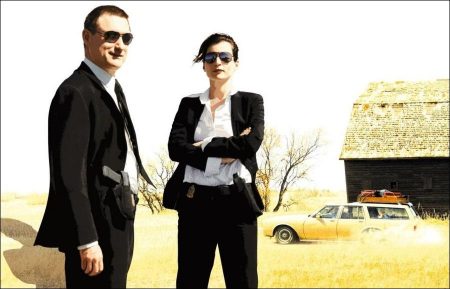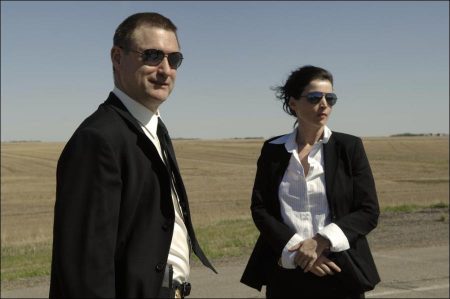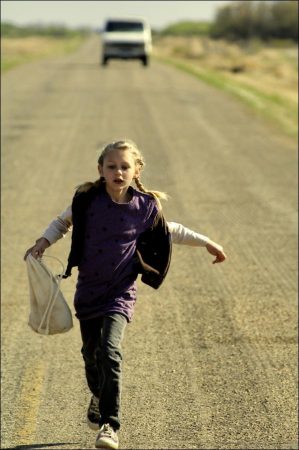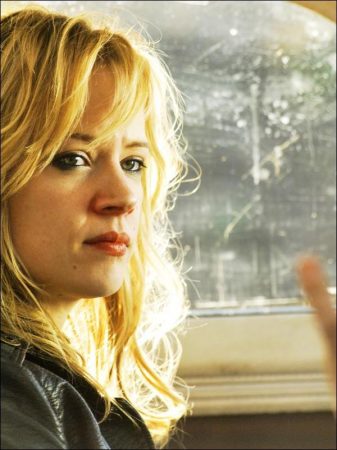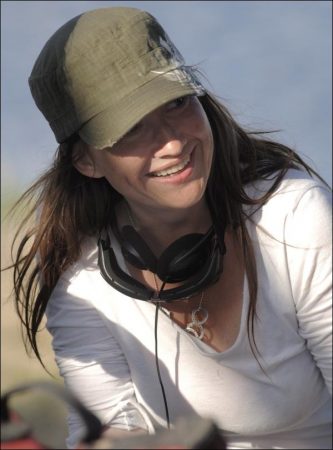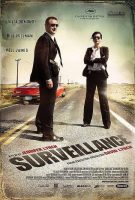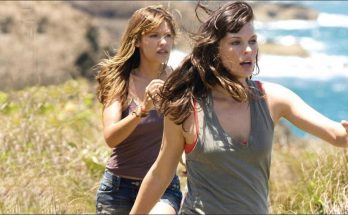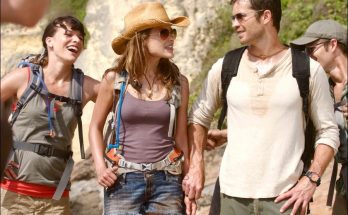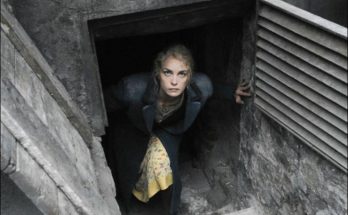Tagline: It’s been a hell of a day on the highway.
The highway in this long stretch of nowhere stretches for miles across a windy, barren landscape. The never-ending horizon seems to retreat the closer you get, and if a car broke down here it might take forever for someone to notice. In the midst of it, Officers Jack Bennett (Kent Harper) and Jim Conrad (French Stewart), sit dangerously bored and dreaming of the kind of glory that can only come with a serial killer or maniac on the loose.
By the time Federal Officers Elizabeth Anderson (Julia Ormond) and Sam Hallaway (Bill Pullman) arrive the next day, a string of violent murders does in fact appear to be plaguing the lonely road. The police are straining at the bit to get back out and apprehend the murderers, but the Feds work differently. In order to uncover the truth of the case, Anderson and Hallaway first have to take their witnesses back-back to what happened when their lives intersected. A few details slowly emerge: Officers Bennett and Conrad were checking the horizon for speeders. Bobbi (Pell James) and Johnny (Mac Miller) were in the cherry Duster, tearing the highway up and having fun.
Little Stephanie’s (Ryan Simpkins) family station wagon was cruising too, with her mom and new step-dad busy singing in the front seat and her brother David next to her in the back. The problem was, as Stephanie saw it, that adults never listen to little kids, no matter how many times she tried to tell them what she saw out the window. Perhaps if they had, it all would have turned out differently. As the Feds slowly expose the fragile little details each witness conceals so carefully with a well practiced lie, the `truth’ they are looking for starts to extract an enormous price no one expected.
About the Film
A taught thriller in the tradition of the great Akira Kurosawa’s Rashômon, Jennifer Lynch’s SURVEILLANCE marks a long awaited return to the big screen for this definitive, and often surprising, filmmaker. Borrowing a page from the Japanese master, Lynch has crafted a stunningly detailed story told from the perspectives of three witnesses. In pure Lynch fashion, however, nothing is as it seems-even at the final moment.
“At its core,” explains Lynch about her film and its genesis, “I’m fascinated by the idea of what it is that an individual sees: primarily what it is to have your life and to see something specifically through your eyes. It’s a completely different experience than anyone else has.
“So, in this story, we have a road between point A and point B. Three different groups find themselves on that road. Certain things happen to all of them. All are forced into one ultimately unfortunate situation where they are obligated to retell what happened.
“Each is a liar and each holds a truth,” continues Lynch. “But the shame that each feels and the reason each one is lying is at the heart of their character. So as we go back in time we realize they are lying, but at the same time we get to know them more deeply.”
The three main groups of characters couldn’t be more disparate. Officers Jack Bennett and Jim Conrad are the fanatic cops who Lynch once described as the kind of men who might watch COPS while drinking a beer and stroking their guns. These officers always wanted to be heroes, but have made certain dark decisions in their lives. Dark decisions that have turned into dark secrets meant to be hidden.
Fun loving drug addicts Bobbi and Johnny are pretty much as one would expect them, yet Bobbi’s testimony reveals the kind of girl who will forgive anyone anything, except herself. And anything that’s happened to her she’s decided she must have deserved to have happened, especially anything negative.
Little Stephanie has the eyes and the soul of a child; she’s not judgmental the way adults are. Stephanie sees the child in Bobbi, and in turn she is seen by Bobbi as hope. There is something in the idea of rescuing Stephanie that Bobbi sees as saving herself, so there is a special bond between these two.
“Everyone’s a liar, everyone’s an open wound,” explains Lynch. “It’s pretty much the kid who allows them all to see what they need to see. These perspectives are all about how someone felt when they encountered someone else. And really we’ve stopped listening to the child inside ourselves. To the children who tend to see things that we’ve forgotten are important. We’re in our ego and kids are in the details.”
SURVEILLANCE is the first feature film Lynch has directed in over a decade, coming after her lauded-and oft criticized-feature film directorial debut, Boxing Helena.
“I wanted SURVEILLANCE to be the next project because I love the characters, I love the insanity of it,” said Lynch. “There is goodness and wholesomeness in it, an investigation of human kind intrigues me.
“Kent Harper, who I’d produced some short films with, originally had a script that was supernatural and in our discussion about his script, other ideas were born. However, our first draft was still supernatural along with what it was to watch other people, to be very voyeuristic.
“Then it occurred to me, if you’re dealing with people who kill each other, and are dead themselves because they are hurt, isn’t it more interesting to deal with why we do things instead of what it looks like when we do things?
“SURVEILLANCE is a scary movie because we’re all just a few bad decisions away from this, a few incidents away from hurting ourselves and others. So like an onion, we peeled the layers and let the story find its voice. A big voice. A loud voice. Especially the ending.
“I love the ending. We have this darkness and light thing going on. Darkness and light is one thing, evil is another. Surprisingly, what I found as dark my dad (filmmaker David Lynch) found as evil. In fact he challenged me on it completely. Called me up late one night to tell me I couldn’t do that at the end of my script!! But of course I can. It’s the right ending to the story.
Shooting the low-budget film on a tight schedule on the plains of CityplaceRegina, StateSaskatchewan, country-regionCanada, Lynch says “Shooting fast-yes that’s how I like to work. I want to keep it going. It’s about moving forward. Some days take more than others, but there’s a rhythm and it’s almost laughable to make a schedule. I grid my way through it. Everyone is valued and a part of it. We’ve been plowing through it against the wind, the ticks, and the rain. The insanity.”
Lynch also worked closely with producing partner, Marco Mehlitz whose credits have included Undiscovered, The Final Cut, and Bowling for Columbine among many others.
“Marco Mehlitz is incredible,” said Lynch of her producer. “He’s not only, intellectually and in terms of skill, one of the finest producers I’ve ever encountered, but he’s the most accessible and, if you’ll forgive the term, human producer.
“There is something to be said for someone who continues to listen even at points where he’s making the hard decisions. He doesn’t just speak to you, he hears you which is incredibly valuable. When he comes on set and says here’s the situation, he’s already gone to the end to figure out what’s happening. It’s a gift. It allows me to feel safe and gives me focus. He’s had an incredibly good career with interesting choices, and has a real eye for story as well as a gift for bringing people together. I owe many of my favorite moments to Marco’s magnetic personality and skill.
“This is an incredibly vital relationship. I wish I could say I picked Marco, but I think Marco picked the project and I just happened to be involved with the project! I’m not sure I want to ever work with anyone else! Even at the most difficult times I’ve been grateful to look across the table and see Marco on my side.”
Mehlitz, who has long been a production executive and co-production specialist, is the CEO/Managing Director and founding partner of Lago Films with offices located in StateBerlin and Studio Babelsberg, country-regionplaceGermany. His North American film company, See Films, is located in CityplaceLos Angeles, StateCalifornia.
It was Mehlitz who first suggested the flat landscape of StateSaskatchewan, country-regionplaceCanada as an ideal location for Lynch, and it was Mehlitz who helped craft a uniquely American film with global creative participation.
“We funded the project entirely out of the country-regionUS, so it is an American independent project,” explained Mehlitz, “and creatively our team includes a producer from country-regionGermany, crew from country-regionCanada, actors from the country-regionplaceUK. Jen’s a distinctly American filmmaking voice, yet she’s crafting a story that tracks to the human condition. I’m very proud of our multi-national team.
“Jen and I have done everything together. It’s great. We are a team. On set, it’s the crew and actors that make up the entire team, and we encourage all to contribute at any point. This is the way I like to work, and so too does Jen. We came out to country-regionplaceCanada as a team, and looked for partners on the project when we interviewed for crew positions. It started with us being very close and then extended when we invited everyone else to do the same thing.”
The camaraderie of the set extended to the actors as well as the crew, as noted by Julia Ormond, who plays FBI agent Elizabeth Anderson, the very first day she arrived.
“You can feel Jen’s energy,’ explained Ormond, “you can tell it from the crew and it ends up on set. It has a mystical quality that ends up on screen. She has something about her that is so strong, she has the energy of a phoenix rising. This is a woman who got mangled by a fickle industry, an industry ready to misinterpret and mash her down.
“She’s taken a long time, but I feel this is somehow her response to that. It’s taken a while, but I think we all feel she’s going to explode through this film and we’re all just holding on for the ride. She’s not your usual lady behind the camera. She’s not cerebral; she’s “in her animal” as she likes to say. We care less about the commercial aspects of the film and more about creating something great out of the story she wants to tell. I’m more excited about this piece than I have been about a project for a long time.”
Lynch assembled a remarkable cast including famed actors Bill Pullman and Ormond, revered character actor Michael Ironside, brilliant comic actors French Stewart and Cheri Oteri, and newcomers Ryan Simpkins and her co-writer, Kent Harper.
Working with the cast was really a matter of inviting them into the creative process for Lynch, who often encouraged improvisation as a tool for character development.
“It’s all about observation,” said Lynch, “both in the movie and in working with actors. Watching others watching you. Monitoring your behavior and others’ behavior. Altering your behavior for others’ ears, which is a natural defense. It’s fascinating to me.
“Having created these characters, at a certain point the ones who’ve come in to create them know more than you do. So I have a lot to learn from them as they put on their characters’ skins. You ultimately need to be a kill switch as a director, but some of what’s come out of an actor’s mind for the character has been priceless.
“Julia Ormond, who is such a joy and surprise, is also such a lady and a woman and so very human. There are places she’s going in this film that are a real treat for me, she’s so good. She has a skill inside her she hasn’t tapped into yet. Certainly behaving like certain characters is easier for some people but this stretch is something she’s yearned for. Where she’s going with it is a gift to the production.
“Bill Pullman. I’m a huge fan. He is one of the most excruciatingly talented actors out there. He’s going some pretty amazing places too, he’s traveling hard you might want to say. We almost worked together on Boxing Helena and I’m so proud he came onto this film.
“Pell James, who I’d seen and heard about, has completely unveiled herself here. From the first day we met, when she sat with her new baby on her chest and we talked about the role, Pell has shone.
“Ryan Simpkins who is so genuinely a kid, which is a rarity in our business now, was perfect as Stephanie. Ryan’s a kid, and she’s a kid who can act. She’s innately perfectly brave and perfectly innocent which is what her character had to express. In her innocence is a wisdom which isn’t in adults who have let their ego take hold. Our innocence lost is also the bravest part of us. Stephanie represents the child in all of us that’s been thrown aside and so she is also the bravest.
“Cheri Oteri. Cheri Oteri. Wow. We were driving home from set the other day and we happened to be in the same car. It was a great chance for me to tell her she’d done something in her performance that was so universally true that I found myself completely in the moment, completely woven into what she was doing with her emotions. So completely into it that someone had to nudge me to get me to yell “cut”. I told her what a huge thing she’d just done. This is an actress with huge talent. I’m glad she’s knocking down the wall. Is she funny? Yes. Is she an actress showing stuff no one’s seen yet? Yes.
“My god, French Stewart. French Stewart is the cop. Obviously when I met with him he was one of the cops, this was his role. I knew he could do it, but also there’s something in there that he uses to just create a pearl from every day. He’s so enjoyable to have around. Anything I say to him he absorbs and takes to a tenth degree. I hope he’s as proud of himself as I am to have been in his company.
“Some people might be surprised by the choice of comic actors in these roles,” admitted Lynch, “but I liken it to when I gave birth: It was excruciating pain but I laughed all the time. It’s where I go when I’m in pain. I think it frees you up to do things.
“And it’s an effort to challenge myself, because I don’t know everything. I know what I want to feel from the character or story. And these actors seemed the best collaborators. That’s what they are, not puppets, collaborators who have brought something to the story that elevates it. There is something about someone who is funny that is so real and so sad at the same time: so human. The urge to make people laugh and please others is incredibly potent to me. It’s true. We’d all like to be the person telling the truth but the truth is funny.”
“I love the set,’ adds Lynch. “I’m more comfortable on the set than probably anywhere else in my life. You know we wake up in our beds in the morning and by the time we get back to them at night we’ve created something that didn’t exist before. And it’s collaborative. And it’s magical. And make believe. Yet, still the greatest hard work.
“It reminds me of my childhood, and dreams I’ve had from my life. To get to tell a story and make it tangible in this way, bring something to fruition. There’s something about being around creative people, it’s the greatest thing in the world.
“It is everybody. Everybody is a piece of the watch and if they don’t all work together we don’t have the right time. And this thing runs like a perfect watch.”
At the end of the day, when Lynch speaks about her audience, she speaks with an experience borne of struggle and respect. “I definitely make films for myself.” Lynch admits. “I have learned, before anything else about filmmaking, that it’s in the process and on the set that is the best part about filmmaking. It is about what you want to make and what you want to create with these other people. That’s where the joy is.
“When I think about the audience, I have to start from the way I’d like to be spoken to about a film. It can’t be a co-dependent process, and I don’t want to speak down to them either. People are smart, they aren’t idiots. So if you’re going to tell them a story, tell them the way it deserves to be told: to a smart audience.
Filmmaker’s Statement – Jennifer Lynch
Jennifer Lynch was only nineteen when she wrote the screenplay for Boxing Helena. She became a published novelist at age twenty-two when she wrote The Secret Diary of Laura Palmer. Her book was on the New York Times Best-Seller List for 15 weeks.
In 1993 at the age of twenty-four, she added the distinction of being the youngest woman in American film history to direct a feature film, directing her screenplay, Boxing Helena which was nominated for a Grand Jury prize at Sundance the same year.
As a woman filmmaker
“Do I think it make a difference that I’m a woman working on this picture? Sure I do. There are things you’ve seen as a mother because of your child; it’s a second chance at seeing things as miracles. It’s also a second chance at being non-judgmental, and to be unconditionally loving of things.
“In a strange way I don’t recall the echo of not having a child, and since I’ve always been a girl or a woman that’s just my voice. So I don’t know if I’d make a different picture not being my daughter’s mother, or my mother’s daughter.
“The strength of humankind is eyes through a child, and there are women in this film that are much stronger than women characters we’ve seen in a long time. This isn’t what your mother does when she’s not baking…well, maybe it is. It’s what my daughter’s mom does when she’s not baking!”
A filmmaker of strong convictions, Lynch has recently produced a number of short films, including “Some of an Equation” and “PlaceNameplaceHandicap PlaceTypeCity.” She was cast in the short film, “Slumming.” She also directed Joe Bob’s Drive-In Theater: Quadriplegia, Nymphomania, and HIV-Positive Night (1995 TV episode) and has written episodes for Friday the 13th television series. Her latest film, Hisss, which she wrote and directed, is currently in post-production.
Moments that jump
“In the same way that I’d love people to find themselves in these awkward moments saying to themselves `eh, I really shouldn’t be enjoying this’; I have felt that way during some of my scenes. Is it polite or appropriate that I enjoy blowing up heads? Maybe! Objectively, probably not. But in my heart, it’s a fun part of the story.
“Some of the long days on the highway, in the extreme weather, with the camaraderie of the team, and the tireless effort and so much love and heart in this, those moments I will talk about the most.
“Beautiful road, skies that went from smoky blue to white clouds to storm clouds and rain, 100km winds, frogs chiming in this really bizarre cricket like voice, trucks, crews, crashed cars, people being tortured in a way…everything the characters went through the crew went through too in a different way, dolled out by mother nature! Tragedy brings you together though, right? The bad days make the best friends!!”
Observation
“I don’t know what I look like when I direct, I don’t know what it’s like to observe me because I’m joyfully in that moment and the least self conscious of any place I’ve ever been. So I don’t know what it’s like for others to observe my process.
“But it’s interesting to me to think about when I watch DVDs and observe other directors; I hope it’s helpful and enjoyable to know that there is no `right’ way to do this process. It’s all about your way. There are certain rules that apply to make it work out but it’s how you do it. If there is something interesting about how I do it for you, great.
“I’m not a video village person. I’m interested in the frame but I can see that at the monitor. I can see no reason to be distanced from the actors. It just makes it harder. I find incredible value and insight to be as near the actors as possible. Hopefully that translates into the picture.”
Born in CityPhiladelphia, StatePennsylvania and raised in CityLos Angeles, StateCalifornia, Lynch attended the PlaceNameInterlochen PlaceNameArts PlaceTypeAcademy in StateplaceMichigan. She also gained an invaluable education while working closely with her father, David Lynch, on his films Blue Velvet and Dune, among others.
Tales in perspective
“Technically, keeping perspectives straight was the tricky part. At the most basic level, three people are telling the same story but it’s different to each of them. What does each story look like? What’s the color of it? What’s missing? What’s relevant to the kid versus the drug addict who misses it because she’s too high? Or the cop who happens to be looking somewhere else?
“In each scene, with each perspective, and that disturbing and difficult ballet of telling the story their way, each character has one part of the story to tell that has to get across clearly and then has all the rest of their perspective of the story to convey.
“Planning the schedule, I said just schedule it in order for the actors. Every actor has to be lying about what has happened. So not only are they acting about lying, let’s make them really lie. It shows in the face. And when the FBI is questioning you, there are things that happen in the face, “tells” if you will, that only happen if you are lying. So that was the only caveat in scheduling. It was important that we started with night one and move through in that order.”
Jennifer Lynch currently lives in CityplaceLos Angeles, CA with her daughter Sydney.
Surveillance (2009)
Directed by: Jennifer Chambers Lynch
Starring: Julia Ormond, Bill Pullman, Pell James, Ryan Simpkins, French Stewart, Kent Harper, Michael Ironside, Pell James, Shannon Jardine, Gerald Lenton-Young, Angela Lamarsh, Caroline Aaron
Screenplay by: Jennifer Chambers Lynch, Kent Harper
Production Design by: Sara McCudden
Cinematography by: Peter Wunstorf
Film Editing by: Daryl K. Davis
Costume Design by: Cathy McComb
Set Decoration by: Andrea Spakowski
Music by: Todd Bryanton
MPAA Rating: R for strong bloody violence, pervasive language, some drug use and a scene of aberrant sexuality.
Distributed by: Magnolia Pictures
Release Date: June 26, 2009
Visits: 75
